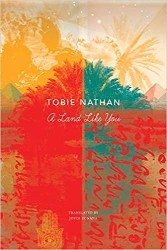Une recension de A land like you par Jean Naggar en anglais :
FICTION

A Land Like You
Tobie Nathan, Joyce Zonana (translator)
- Review
By Jean Naggar – March 29, 2021
In his latest novel, A Land Like You (short-listed for the Prix Goncourt in 2015), Tobie Nathan has written a beautiful and immersive novel, plunging readers headlong into Egypt’s unique history and extraordinary variety of cultures. Nathan interweaves the worlds of the voluble Jews from Haret el Yahud—the Cairo Jewish Quarter — with those of the Muslims of Bab El Zuweyla, along with the complex international communities that connect and divide them. Propelled forward by vivid, unforgettable characters, the layers of political, historic, and mystical Egypt tumble together into a rich mosaic, encompassing a period of great change from 1918 to the 1950s.
Within the crowded Haret El Yahud, Esther, an orphaned child, suffers a traumatic accident that reshapes her future. The trauma leaves Esther’s relatives, and the larger community, convinced she is possessed by alien spirits and demons. Beautiful, wild, and ungovernable, Esther clearly marches to the beat of her own drum. Her intimacy with unseen forces commands consternation and respect, distinguishing her in the often claustrophobic community of Jews who inhabit the twisted paths and teeming dwellings of the Haret El Yahud. For Jews and Arabs alike, religious mysticism and close contact with the spirit world imbues their daily lives with wonder and drama. Urged on by a multitude of anxious relatives, Esther marries at fourteen, and finds deep love and happiness with Motty, an older man, blind from birth. Sadly, the love between them produces no child in seven years of marriage. Her quest for motherhood eventually results in a son, Zohar, but she has no milk with which to feed him, so she seeks out a woman in the Muslim quarter who has recently given birth to a daughter, Masreya.
Time and distance separate the milk-twins, until chance casts teenage Zohar into a desert village, where he comes upon Masreya — a talented dancer, an enigmatic beauty. Not recognizing her, and not understanding the forces that bind and separate them, he falls deeply in love with her. Inextricably linked by destiny, they form a forbidden passionate attachment that connects them as they interact with pillars of the Jewish community, the movers and shakers of the wartime British occupation, and the young King Farouk among other iconic figures.
A true tour-de-force, the novel is deeply embedded in the humanity of its characters, historic and imagined. The story holds the reader in thrall from beginning to end. The novel is driven by the many unforgettable personalities, leaping from splendid palaces of the rich and famous, to the hidden passageways of the Jewish and Arab quarters. At the center of it all are Zohar and Masreya. This multifaceted story is fueled by passion and politics, bursting with sensuality, where characters must navigate turbulent scenarios of love and death. It incorporates mysticism, magic realism, and the beliefs of a diverse populace through generations of interconnectivity.
Decades later, Zohar is finally severed from Egypt; that land of contradictions, beauty, and possibility spits him out into an alien world. Ultimately, his story also serves as a brilliant metaphor for the Diaspora as a whole. Like many other Jewish exiles throughout history, Zohar feels deeply attuned to a country that ejects him nonetheless; he is left with the sounds and scents of the lost world, and the experiences and histories that came together in him but are almost impossible to reconcile or to communicate.
This is a riveting novel — a must-read. Not only is it a story of great beauty and lyricism, but also it has been superbly translated from French into English by Joyce Zonana, so that the essence of meaning — both literal and esthetic — reaches the reader in all its power.
Jean Naggar is the founder of the Jean V. Naggar Literary Agency (JVNLA), and the author of a memoir, Sipping From The Nile: My Exodus From Egypt, and a novel, Footprints on the Heart. She also maintains a monthly blog: www.jeannaggar.com/blog.




